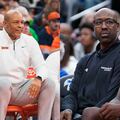Alfred quarterback Sopak overcomes challenges of diabetes
While playing basketball at the local gym with his dad, an 8-year-old Zach Sopak became fatigued. His mouth dried up. He stopped playing and went to see a doctor.
There, Sopak found out his blood sugar level was about 500 milligrams per deciliter. It should have been between 60 and 120. Doctors sent Sopak to Buffalo Children’s Hospital where he was diagnosed with Type 1 diabetes.
“It’s real tough at times because there’s so many factors that go into it, and it’s really hard to control,” said Sopak, now the starting quarterback at Alfred University in New York. “It’s like having a job 24 hours a day.”
Ten years after his hospital visit, Sopak took a phone call from Alfred assistant football coach Robert Rankl. Ten minutes later, Washington and Jefferson College head coach Mike Sirianni called. Both asked him to play quarterback for their respective teams.
Each coach got the same answer: “It was fifty-fifty.”
Sopak chose Washington and Jefferson that spring, citing his familiarity with Sirianni. Sopak played for Sirianni’s brother, Jay, at Southwestern High School. Together, they won the New York State Class C state championship in 2008 and 2009. Sopak also earned Class C Player of the Year honors in both of those seasons.
He earned the No. 3 quarterback position in his freshman year at Washington and Jefferson. His outlook was good. But while struggling to combat his diabetes, he lost the sophomore quarterback competition to Matt Bliss.
In his first two years of college, Sopak was living on his own for the first time in his life. He became lazy about managing his disease and it damaged his pursuit of playing time.
Alfred came back in the picture. And, on Sept. 8, the Saxons begin their season against RPI with Sopak under center.
“I’d have to sit out a lot of segments of practice, and now, with this training staff, they’re really on top of it and they’re really helping me, and I haven’t really sat out as much as I usually would,” Sopak said.
Sopak misses about 10 minutes of each two-and-a-half-hour practice at Alfred. Every 15-20 minutes on the practice field, he pricks a finger on his left hand to check his blood sugar. The training staff monitors fluctuations in his blood sugar.
When it gets too low, he takes a sugar tablet or drinks Gatorade. When too high, he uses an insulin pump. In Saturday’s scrimmage against Susquehanna University, he checked his sugar every time he came off the field.
But Sopak doesn’t let the diabetes hold him back anymore.
At the beginning of this year’s spring practice, he was listed dead last on the depth chart behind eight other quarterbacks. Six practices later – within a week and a half – Sopak was the starter.
“He did everything we asked him to, and we’ll always play our best guys,” assistant coach Richard Puccio said.
During the spring semester, Sopak lived with Tom Secky, a four-year starting quarterback for Alfred who just finished his career the previous fall. Secky gave Sopak tips ranging from the depths of the team’s playbook to what opposing defenses know about the Saxons’ attack.
Sopak also credits his roommate in keeping him on track with managing his diabetes.
On top of his studying under Secky, Sopak spent an extra hour each day of spring practice with his coaches at the McLane Center studying film and reviewing the playbook. The results showed on the practice field. He won his teammates over quickly.
“The team, they like him a lot. You know, he’s a good quarterback,” sophomore guard Kyle Woodard said. “He can make the throws, and the wide receivers like that.”
Puccio pointed toward Sopak’s humble demeanor as a key to earning the trust of his teammates.
Sopak is expected to lead an Alfred team that went 8-3 last year. The Saxons were picked No. 3 in the Empire 8 preseason coaches’ poll and are the defending ECAC Northeast Bowl champions. There are holes to be filled all around the roster, none bigger than that left by the graduation of All-American linebacker Nick Clark.
Sopak knows he can only control so much. But he’s tackling the challenge head on, just months after joining the team and being thrust into a leadership position. It’s a philosophy that’s helped him in getting on the field for the Saxons and in staying there while fighting his disease.
“It just comes down to how bad do you really want to be good,” Sopak said. “If you want to really succeed in what you do, you’re going to do everything in your power to get better and know what you’re supposed to be doing, helping other people and that just makes a team.
“All of a sudden, everybody’s on the same page.”




